|
|
|
Sort Order |
|
|
|
Items / Page
|
|
|
|
|
|
|
| Srl | Item |
| 1 |
ID:
156246
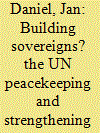

|
|
|
|
|
| Summary/Abstract |
This paper contributes to the debate on the recent ‘stabilization turn’ in United Nations (UN) peacekeeping by inquiring into a changing set of practices by which the UN intends to ‘strengthen the authority of the state.’ Drawing on Piiparinen’s notion of sovereignty-building as an emerging paradigm of conflict management, the study analyses the support for state authority and sovereignty in two modalities of contemporary UN peace operations – UNIFIL II and MINUSMA. While the two analysed missions significantly differ when it comes to the extent of their tasks, or the rules for the use of force, they both highlight the importance of local politics and agency in the implementations of their mandates and the need to strike a compromise between the contending visions on what form of sovereignty should be supported. By doing so, the paper points out the importance of ‘local’ and contextual emergence of the practices of sovereignty-building.
|
|
|
|
|
|
|
|
|
|
|
|
|
|
|
|
| 2 |
ID:
161259
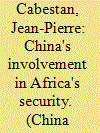

|
|
|
|
|
| Summary/Abstract |
China has been much more involved in Africa's economy and trade than in its security. However, over the past decade or so, China has increased its participation in the United Nation's Peacekeeping Operations (UN PKOs), particularly in Africa. It has also taken steps to better protect its overseas nationals and, in 2017, established a naval base in Djibouti. This article focuses on the participation of China's People's Liberation Army in the United Nation's Multidimensional Integrated Stabilization Mission in Mali (MINUSMA) since 2013. It aims to unpack the diplomatic process that led China to take part in this mission and to analyse the form of this participation. Mali was the second time (the first being in South Sudan in 2012) that China opted to deploy combat troops under the UN banner, underscoring a deepening involvement in PKOs and an increasing readiness to face risks. Finally, this article explores the implications of China's participation in the MINUSMA for its foreign and security posture as a whole. Often perceived as a realist rising power, by more actively participating in UN PKOs China is trying to demonstrate that it is a responsible and “integrationist” great power, ready to play the game according to the commonly approved international norms. Is this really the case?
|
|
|
|
|
|
|
|
|
|
|
|
|
|
|
|
| 3 |
ID:
168172
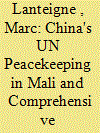

|
|
|
|
|
| Summary/Abstract |
China's increasing participation in United Nations peacekeeping operations reached a milestone in 2013 when Beijing agreed to send a large detachment of personnel, including combat forces for the first time, to support UN peacekeeping operations in Mali after that country fell into civil war. This commitment was also distinct in that unlike other African countries where Beijing has supplied peacekeepers, Mali is not a major trading partner with China. However, this mission has both cemented Beijing's greater commitment to building African partnerships as well as demonstrating its determination to move beyond “resource diplomacy” and towards a more comprehensive approach to engaging the continent. Although China has warmed to the principles of humanitarian intervention in civil conflicts, Mali has been a critical test of China's ability to participate in UN operations in a country which is still facing ongoing violence. The Mali mission is an important step in Beijing's turn towards greater realpolitik in Chinese Beijing's peacekeeping policies in keeping with its great power status. At the same time, participation in the Mali mission has been beneficial for China, not only in helping to build the country's peacekeeping credentials in Africa but also in underscoring China's increasingly distinct views on addressing intervention in civil conflicts.
|
|
|
|
|
|
|
|
|
|
|
|
|
|
|
|
| 4 |
ID:
149278
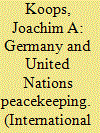

|
|
|
|
|
| Summary/Abstract |
This article examines Germany’s past, present and future approach to UN peacekeeping, particularly in the context of a potential ‘European return to UN Peacekeeping’ and the country’s recent commitment to contribute to the Multidimensional Stabilization Mission in Mali (MINUSMA). By applying a conceptual framework for assessing facilitating and inhibiting factors related to Germany’s past and current participation in UN peacekeeping operation, the article argues that core reasons for German troop contributions range from bilateral partnerships and multilateral pressures, to the role of individual policy entrepreneurs and inter-organizational aspects. Yet, Germany’s culture of restraint and public scepticism towards military operations act as important inhibiting factors. Most crucially, Germany has since the early 1990s pursued an instrumentalist approach to UN peacekeeping in order to strengthen its international profile within a discourse of ‘assuming more responsibility’, to advance ‘normalization’ in security affairs and to enhance internal political and external bilateral security cooperation schemes. Germany’s recent commitment to MINUSMA and its discourse will not result in a ‘big bang’ return to UN peacekeeping, but rather to selective commitments on a carefully assessed case-by-case basis.
|
|
|
|
|
|
|
|
|
|
|
|
|
|
|
|
| 5 |
ID:
181423
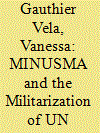

|
|
|
|
|
| Summary/Abstract |
MINUSMA, the UN peace operation in Mali, represents a new development in peace missions, due to the insecure transnational context in which it has evolved and its mandate to collaborate with counterterrorist forces in the region. The goal of this paper is to study this new development, using Enloe’s feminist theorization of the concept of militarization. I base my analysis on an understanding of militarization as a social process that can be adapted or contested. Grounded in a qualitative methodology, I study MINUSMA and its peacekeepers in order to identify how the process of militarization takes place within/through the mission. My principal argument is that the context of robust peacekeeping, combined with the implications of collaboration with counterterrorist operations and the reengagement of NATO troop contributing countries, creates a space in which militarization is reinforced for the mission and its peacekeepers and that this impacts how they interact with one another and what practices they favour.
|
|
|
|
|
|
|
|
|
|
|
|
|
|
|
|
| 6 |
ID:
138987
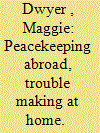

|
|
|
|
|
| Summary/Abstract |
This article draws attention to a trend in which military deployments as part of peacekeeping missions have triggered army mutinies in some West African countries. It explains how participation in peacekeeping missions created new material grievances and a sense of injustice amongst the peacekeepers, which under certain conditions sparked domestic mutinies. These uprisings in West Africa follow a history of military disobedience in the region, and the article places them in the context of long-standing tensions within military organizations. Mutinies often symbolize and intensify divisions within armed forces, which can lead to further instability even after the mutiny is resolved. Therefore, it is important for those interested in building and maintaining effective militaries to understand the ways in which deployments and peacekeeping participation can contribute to unrest within the armed forces. The article draws on interviews with former mutineers, including peacekeepers, and others military personnel in West Africa, as well as media reporting, including public statements made by mutineers, academic writing, and archival research.
|
|
|
|
|
|
|
|
|
|
|
|
|
|
|
|
| 7 |
ID:
124450
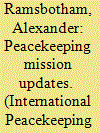

|
|
|
|
|
| Publication |
2013.
|
| Summary/Abstract |
All members of the National Commission for Dialogue and Reconciliation, including its President and Vice-Presidents, officially took office in March and April. There was criticism in some quarters that the selection process for membership had not been transparent and that there had been inadequate inclusion of religious, community and traditional leaders.
|
|
|
|
|
|
|
|
|
|
|
|
|
|
|
|
| 8 |
ID:
172872


|
|
|
|
|
| Summary/Abstract |
The work of international interventions, whether grandiose or commonplace in scale, requires credible, verified information. Nevertheless, in settings of armed conflict that interventions aim to transform, information is more often than not improvised, unofficial, fragmented and based on multiple competing imaginaries. Interventions, therefore, are significantly influenced by rumours: the circulation of information and stories based on uncertain accounts of questionable provenance. Research on international intervention has neglected the place and power of rumour. To address this lacuna, this article examines the impact of rumour on the intervention logics and practices of the United Nations Multilateral Stabilization Mission in Mali (MINUSMA). It argues that rumours evince an epistemological force that generates constitutive effects among different sets of conflict actors in Mali. To address the impacts of rumours, different divisions within the intervention pursue practices of investigation, correction and officialization. Nevertheless, by enacting these practices, political tensions emerge that reveal contradictory intervention logics within MINUSMA, and foster conflictual relations between the intervention and different conflict actors in the country, thereby decreasing how Malians perceive MINUSMA's legitimacy.
|
|
|
|
|
|
|
|
|
|
|
|
|
|
|
|
| 9 |
ID:
170308


|
|
|
|
|
| Summary/Abstract |
A fundamental question facing global governance today is whether the UN peacekeeping regime can function with enough skilled troops to execute increasingly demanding and complicated mandates. The People’s Republic of China is informally thought of as a potential lead troop-contributing country. China typically deploys non-combat enabler troops, and recently began deploying combat troops, which may have to engage in live fire to defend the mandate. The risks and costs associated with dispatching combat troops challenge the benefits that China derives from supporting peacekeeping. I first establish China’s feedback mechanisms to facilitate simple and complex learning against China’s peacekeeping trajectory and motivations for participation. I then address the implications of China’s combat troop deployment, focusing on the UN Multidimensional Stabilization Mission in Mali and the UN Mission in South Sudan. The article draws insights from interviews with Chinese foreign policy elites and UN officials, and participant observation at the UN Department of Peacekeeping Operations.
|
|
|
|
|
|
|
|
|
|
|
|
|
|
|
|
| 10 |
ID:
166781
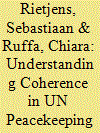

|
|
|
|
|
| Summary/Abstract |
Coherence is a core objective in most multinational interventions and seems of particular relevance to UN peacekeeping missions with their increasing complexity and multidimensionality. Yet, coherence has rarely been studied empirically. We borrow the concept of ‘fit’ from organizational theory and use it to develop a conceptual framework to study coherence in peacekeeping operations. Fit is the degree of match between what is required by the mandate, on the one hand, and an institutional set-up and the implemented practices, on the other. We identify three relevant dimensions of fit to study coherence: strategic and organizational, cultural and human and operational fit. Our empirical material focuses on the UN mission in Mali (MINUSMA) and in particular on the interplay between the intelligence components and the rest of the mission. We draw upon a large empirical dataset containing over 120 semi-structured interviews, field observations and participation in pre-deployment exercises and evaluation sessions. Our empirical analysis suggests that low level of fit across several dimensions leads to inertial and widespread frictions in the practice of peacekeeping and could potentially undermine peacekeeping effectiveness. Building on existing scholarship on micro-level approaches to peacekeeping, we hope to further the debate on organizational dynamics within peace operations.
|
|
|
|
|
|
|
|
|
|
|
|
|
|
|
|
| 11 |
ID:
173194
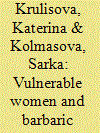

|
|
|
|
|
| Summary/Abstract |
Examining the case of Mali, this work analyses the discursive strategies utilised by key actors to legitimise the UN’s Multidimensional Integrated Stabilisation Mission in Mali (MINUSMA). The analysis traces the legitimisation strategies deployed in both the official and unofficial discourses surrounding the operation. Using van Leeuwen’s conceptualisation of legitimisation, this work uncovers the subtle and not-so-subtle ways the dominant discourse foregrounds certain gendered harms. We argue that the primarily Western conceptualisation of the situation in Mali foregrounds the rape (of young girls) to form the strongest pro-intervention argument. Within this logic, the focus on the bodies of violated women and children aims at providing the undeniable and ultimate proof of barbarity of local rebels. This leads to an immediate need for deployment and continuation of a robust peacekeeping mission.
|
|
|
|
|
|
|
|
|
|
|
|
|
|
|
|
|
|
|
|
|